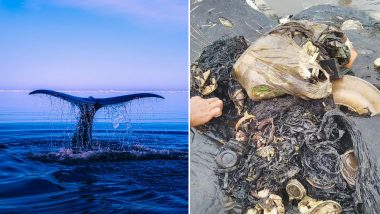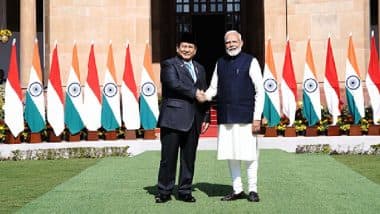A dead sperm whale washed ashore Kapota Island with 6kg plastic in its stomach. The dead whale found at Wakatobi National Park in Indonesia on Monday has added fuel to the talks on the treatment of plastic waste. Park officials said that the waste included 115 drinking cups, four plastic bottles, 25 plastic bags and two flip-flops.
Park chief Heri Santoso said that they found the 9.5-metre whale after environmentalists informed that the villagers were planning to butcher the carcass. The Guardian quoted Dwi Suprapti, a marine species conservation coordinator at WWF Indonesia as saying that the exact cause of the whale's death is not known if plastic caused the whale's death. Dead Baby Blue Whale Washes Ashore on Kamakura Beach in Japan.
According to a study published in the journal Science in January, Indonesia produces 3.2 million tons of mismanaged plastic waste a year, of which 1.29m tons go into the ocean. Indonesia is the world's second-largest plastic waste producing country after China. World Wide Fund for Nature tweeted the exact contents found inside the whale as "hard plastic (19 pieces, 140g), plastic bottles (4 pieces, 150g), plastic bags (25 pieces, 260g), flip-flops (2 pieces, 270g), pieces of string (3.26kg) & plastic cups (115 pieces, 750g)."
Here is what was found inside the whale:
5,9 kg sampah plastik ditemukan di dlm perut paus malang ini! Sampah plastik yaitu: plastik keras (19 pcs, 140 gr), botol plastik (4 pcs, 150 gr), kantong plastik (25 pcs, 260 gr), sandal jepit (2 pcs, 270 gr), didominasi o/ tali rafia (3,26 kg) & gelas plastik (115 pcs, 750 gr). pic.twitter.com/ZFWZgkbnzu
— WWF-Indonesia (@WWF_ID) November 19, 2018
The Indonesian government is trying to reduce its plastic waste problem and has pledged USD 1 billion annually towards it. In recent years, there has been an increase in deaths of whales. In a similar incident, a pilot whale died in Thailand after consuming 80 plastic bags.
Penemuan ini diungkapkan oleh investigasi bersama DKP Wakatobi, Balai Taman Nasional Wakatobi, Badan Promosi Pariwisata Daerah, Akademi Kelautan dan Perikanan Wakatobi, WWF, bersama masyarakat setempat. pic.twitter.com/XCF7EzKaBC
— WWF-Indonesia (@WWF_ID) November 19, 2018
This national park is popular among divers for its coral reefs and diverse marine life. According to the 2015 Ocean Conservancy report, about eight million tonnes of plastic waste ends up in the world's oceans every year. More than half of the waste comes from five Asian countries: China, Indonesia, the Philippines, Thailand and Vietnam.
(The above story first appeared on LatestLY on Nov 21, 2018 04:17 PM IST. For more news and updates on politics, world, sports, entertainment and lifestyle, log on to our website latestly.com).













 Quickly
Quickly




















